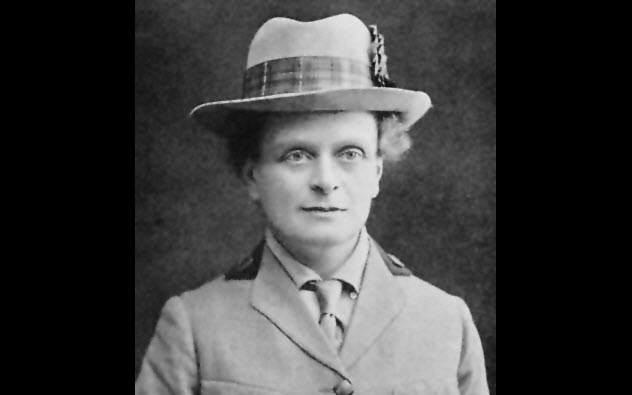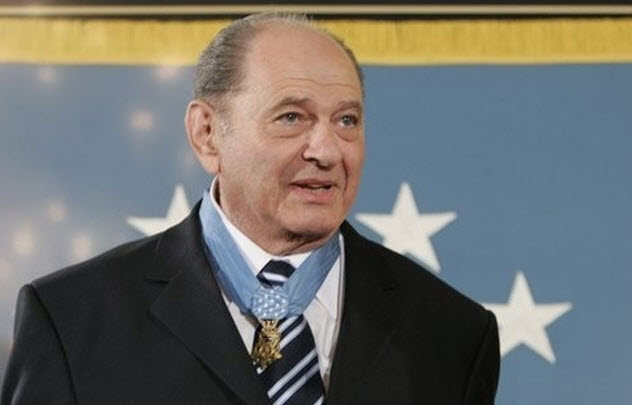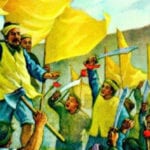 History
History  History
History  Health
Health 10 Everyday Activities That Secretly Alter Consciousness
 History
History Top 10 Historical Disasters Caused by Someone Calling in Sick
 Animals
Animals 10 New Shark Secrets That Recently Dropped
 Movies and TV
Movies and TV 10 Forgotten Realities of Early Live Television Broadcasts
 Technology
Technology 10 Stopgap Technologies That Became Industry Standards
 Weird Stuff
Weird Stuff 10 Wild Facts About Taxidermy That You Probably Didn’t Know
 Travel
Travel 10 Beautiful Travel Destinations (That Will Kill You)
 Miscellaneous
Miscellaneous 10 Modern Marriage Rituals Born from Corporate Branding
 Weird Stuff
Weird Stuff Ten Bizarre Visions of 2026 from Fiction
 History
History 10 “Modern” Problems with Surprising Historical Analogs
 Health
Health 10 Everyday Activities That Secretly Alter Consciousness
 History
History Top 10 Historical Disasters Caused by Someone Calling in Sick
Who's Behind Listverse?

Jamie Frater
Head Editor
Jamie founded Listverse due to an insatiable desire to share fascinating, obscure, and bizarre facts. He has been a guest speaker on numerous national radio and television stations and is a five time published author.
More About Us Animals
Animals 10 New Shark Secrets That Recently Dropped
 Movies and TV
Movies and TV 10 Forgotten Realities of Early Live Television Broadcasts
 Technology
Technology 10 Stopgap Technologies That Became Industry Standards
 Weird Stuff
Weird Stuff 10 Wild Facts About Taxidermy That You Probably Didn’t Know
 Travel
Travel 10 Beautiful Travel Destinations (That Will Kill You)
 Miscellaneous
Miscellaneous 10 Modern Marriage Rituals Born from Corporate Branding
 Weird Stuff
Weird Stuff Ten Bizarre Visions of 2026 from Fiction
10 Incredibly Inspiring Stories From Hideous Wars
Conflict brings out the worst in our species. Look at any great war, and it’s clear that there are no depths we can’t plumb with our capacity to hurt one another.
But desperate times can also bring out the best in us. Occasionally, someone faced with horrors beyond description will do something that transcends basic humanity and makes them a bona fide hero.
10 The Muslim And Jewish Families Who Saved Each Other

The early 1940s were a terrible time to be a Jew. One of the worst places was the city of Sarajevo. Sandwiched between the genocidal ambitions of the German Nazi Party and the fascist Croatian Ustasa, the city’s Jews perished in terrifying numbers. By the end of the Holocaust, 85 percent of Sarajevo’s 12,000 Jews were dead.
By rights, Yosef Kavilio should have been among them. A prominent Jewish businessman, he was a target for the gestapo. He survived thanks to his Muslim business partner, Mustafa Hardaga, and Mustafa’s wife, Zejneba.
In 1941, they hid Yosef in their family home despite the fact that harboring Jews was punishable by on-the-spot execution. They did this while literally living opposite the gestapo headquarters, a move somewhere between suicidally brave and simply suicidal.
Yet, somehow, Yosef survived long enough to escape with his family to Israel. He never forgot the kindness that his business partner had shown him, telling his children all about the Sarajevo family who had saved him. He didn’t know it at the time, but 50 years later, his children would return the favor.
Fast-forward to 1992 and the horrifying Bosnian War. Anti-Muslim Serbian troops surrounded Sarajevo and shelled its inhabitants into dust. In Israel, Yosef’s surviving family members were watching the news. Incredibly, they decided then and there to save the family who had spared their patriarch.
With the help of Yad Vashem and a small number of Jewish contacts in Sarajevo, the Kavilio family located the Hardagas. Mustafa had died decades earlier, but his wife, Zejneba, was still alive—although just barely.
Frail and elderly, she was hiding from Serbian sniper fire in a damp basement. She was in desperate need of food and medicine. The Kavilios managed to have her and her youngest daughter evacuated to Israel, saving their lives. Five decades after her selfless decision to save Yosef Kavilio from certain death, her good deed was finally rewarded.
9 The FARC Hostage Turned Peacemaker
We recently told you about the scary tactics used by Colombian group FARC during their bloody, 52-year terror campaign. Safe to say, being held hostage once by the group would be a scarring experience for most people. On the other hand, American pastor Russell Martin Stendal was kidnapped by FARC soldiers five times.
In the face of a deadly terror group who seemed hell-bent on holding him captive, Stendal did the most Christian thing possible. He forgave them, befriended them, and then steered the FARC high command toward making peace with the Colombian government.
While many factors have played a role in Colombia’s current peace talks with FARC (as we discussed here), Stendal was undoubtedly one of them. The group currently describes him as their spiritual guide, and FARC sources confirmed to The Guardian that Stendal has significant influence over their leaders.
Apparently, he’s putting that influence to good use. Currently in Havana for the peace talks, Stendal is acting as a “spiritual light” for the rebels, gently pushing them to do the Christian thing and lay down their weapons. Not bad for a guy who once spent five months tied to a tree in the Colombian jungle as a guerrilla hostage.
8 The Most Determined Nurse In World War I

Winston Churchill once said that the name Elsie Maud Inglis would “shine forever in history.” That you’ve probably never heard of her isn’t thanks to Churchill’s penchant for hyperbole. It’s thanks to the world somehow forgetting a nurse who “made Florence Nightingale look like a part-time care assistant.”
A suffragette, Inglis was desperate to help people wherever they were. When World War I broke out, she immediately petitioned the British War Office to create a women’s medical unit for treating soldiers during battle.
A War Office spokesman told her “to go home and sit still.” Inglis decided to give the guy a practical lesson in feminism by immediately packing her bags and heading to France.
Stationed on the front lines from 1914, she seemed to take the Great War’s staggering death toll as a personal challenge. In no time at all, she had opened two hospitals in France and one in Russia. She had also personally gone to Serbia to show a raging typhus epidemic who was boss.
When Austro-Hungarian troops rolled into the Balkan nation, she refused to abandon her patients and was captured along with them. When the Allied powers struck a deal for her release, she made sure that 13,000 Serbs were released right alongside her. To this day, she’s considered a national hero in Serbia.
By the time that Inglis died of cancer in 1917, she had saved enough people to populate a small city. It’s a crying shame that she’s now all but forgotten.
7 The Taliban Target Saving Afghanistan’s Music
You may have heard someone say that they’d give their life for music. Ahmad Sarmast really means it. An Afghan musicologist, he returned to his home country after the fall of the Taliban with one goal in mind: to preserve Afghanistan’s musical heritage for future generations.
Afghanistan is a country with a strong oral history. Things like stories, histories, and music are rarely written down but instead passed on from one generation to the next through demonstrations. When the Taliban came to power, they banned music. The whole musical history of Afghanistan was in danger of dying out.
Sarmast’s self-proclaimed mission was to get all of these old songs written down in Western notation and to teach girls to play instruments in defiance of the religious nutcases in his country. The nutcases took one look at his innocent project and decided to kill him.
In 2014, the Taliban bombed a concert that Sarmast was attending. The bomber detonated his vest right behind Sarmast, blowing shrapnel deep into Sarmast’s skull and making him deaf.
But even with a head full of metal and no hearing, the soft-spoken musicologist went straight back to what he does best: saving music and defying Islamists. He even had his hearing partially restored through an operation in Australia.
6 The Monk Who Saved Mosul’s Books From ISIS
When ISIS rolled into Mosul in 2014, the only thing on most residents’ minds was getting the heck out of there. But Dominican friar Najeeb Michael had something else to worry about.
In charge of digitizing ancient manuscripts at the library in Mosul for over 10 years, Michael realized that the Islamists would destroy all the precious books he’d worked so hard to preserve. Centuries of Iraqi history would disappear in the blink of an eye.
Faced with such a dilemma, most of us would probably elect to get out of Mosul. But Michael thought differently. As the Islamist fighters stormed the town, he began packing his car with box upon box of ancient books. He even handed them out to passersby to take with them. He made it his mission to save as many manuscripts as possible.
This was in the face of a terrifying insurgent group known for its brutality. ISIS would have happily killed the Christian Michael if they had gotten their hands on him. Michael also kept halting his escape mission to let children and disabled people who were fleeing ISIS into his car. The only word to describe that behavior is “heroic.”
In the end, Michael smuggled nearly 900 irreplaceable manuscripts across the border into Iraqi Kurdistan. In doing so, he saved a whole swath of Mosul’s culture for future generations.
5 The Israeli And Palestinian Organ Donors
The tale of Ahmed Khatib, a 12-year-old Palestinian, should be utterly tragic. He had the misfortune to be playing with a toy gun when the Israel Defense Forces (IDF) stormed the West Bank Jenin refugee camp in 2005. Reacting to a perceived threat, an Israeli soldier shot the poor boy through the head. The IDF immediately apologized, but it was still a depressing waste of life.
Or so you’d think. Ahmed’s parents had other ideas.
After their boy was taken to an Israeli hospital, the couple surprised everyone by asking to donate his organs. They knew that this would save the lives of people generally thought of as the enemies of Palestinians, yet they did it anyway. Thanks to their kindness, Ahmed’s death was not in vain. His organs saved the lives of six Israelis, including four Jewish children.
But what’s most incredible is that Ahmed’s story isn’t unique. A couple of years earlier, a visiting Scottish Jew named Yoni Jesner died when a Palestinian suicide bomber attacked the bus on which he was riding. His family agreed to donate his organs, one of which saved the life of a Palestinian girl. Proof that even in the darkest conflicts, we can still be united by our common humanity.
4 Abdul Haji Kicks Some Terrorist Butt
Imagine for a second that you get a text from your brother saying that he’s inside a mall that has been attacked by terrorists. He expects to die any second. What do you do? If you’re Abdul Haji, the answer is grab a gun, drive to the mall, and single-handedly take on those terrorists.
A Kenyan of Somali ethnicity, Abdul unwittingly charged headlong into Kenya’s ongoing battle with Al-Shabab militants from neighboring Somalia. The terrorist attack in question was the infamous Nairobi Westgate Mall assault in 2013 which killed 67. The death toll would have been even higher were it not for Abdul.
A businessman with a pistol license, Abdul took his weapon to the mall and opened fire on the Islamic militants with no thought for his own safety. At the time, security forces were nowhere to be seen.
Abdul was joined by a handful of plainclothes officers and some medics from the Red Cross. Their ragtag group went from floor to floor of the mall. They gave cover to trapped civilians and helped them to escape.
At one point, Abdul managed to save a four-year-old girl and her mother who were hiding literally inches from the jihadists, shielded only by a single table. He even managed to find his brother, who miraculously survived the attack. To this day, the modest Abdul denies being a hero.
3 Israeli Media Moves Mountains To Save Two Palestinian Children
In December 2008, Dr. Izzeldin Abuelaish was preparing to move his family to Canada. A Palestinian native of Gaza, he had worked in many hospitals across the border as a fertility specialist, delivering scores of Israeli babies.
He was friends with influential media figures, such as news anchor Shlomi Eldar, and was respected by both Palestinians and Israelis. Then came Operation Cast Lead and with it, the end of Abuelaish’s world.
A 22-day conflict between the IDF and Hamas, Operation Cast Lead erupted when Islamists fired rockets into Israel. In the resulting battle, over 750 civilians died in Gaza after being accidentally hit by Israeli fire. Among them were Abuelaish’s children.
On the 20th day, IDF tank fire hit the doctor’s home twice. One shell exploded right on the room where his daughters and niece were studying. Teenagers Mayar, Aya, and Noor were obliterated by the blast, their limbs strewn across the room.
Daughter Shatha, 17, was left with her eye dangling on her cheek and one hand holding on by a thread. The second shell left his brother Nasser injured and his niece Ghaida a mess of wounds. Faced with such unrelenting horror, Abuelaish called the only person that he could think of: Shlomi Eldar.
At the time, Eldar was live on air, reporting on the conflict. Incredibly, he interrupted the broadcast to answer his phone. You can see for yourselves what happened next in the video above.
Eldar put the call on speakerphone. The tragedy of Abuelaish’s family unfolded in real time before the entire nation, resulting in an outpouring of sympathy.
At the same time, Eldar called the nearest Gaza checkpoint and demanded that they open the border. By calling in an insane number of favors, the news anchor managed to get Abuelaish’s injured children into an ambulance, into Israel, and into a hospital that was able to save their lives. The hospitals in Gaza were simply too overwhelmed.
It was a tremendous effort but worth it. Shatha’s eye was saved, and so was Ghaida’s life. In a final twist, one of the IDF soldiers involved in the operation later turned Abuelaish’s story into a sympathetic play for Israel’s National Theater.
2 The Ordinary Kenyan Muslims Who Saved Their Christian Countrymen
In recent years, Al-Shabab militants have begun conducting raids over the Somalia border into Kenya. One of their more gruesome tactics is to take everyone hostage in a cafe or school or on a bus and separate them into Muslims and Christians. Then these Islamists execute the Christians.
That’s exactly what the militants expected to happen on December 21, 2015. They boarded a bus near the small village of El Wak and ordered the passengers to split into two groups. The Muslim passengers took one look at these terrorists and refused to play ball.
Faced with a group of heavily armed murderers, the local Muslims refused to let their Christian brothers go to the slaughter. At one point, the Muslims even told the militants to “kill us together or leave us alone.” At that moment, these ordinary men and women were more than happy to die to protect Kenyan unity.
Thankfully, it didn’t come to that. Faced with this show of unity, the gunmen exited the bus and left with their tails between their legs. Instead of becoming a bloodbath, their bus attack made Kenya stronger.
1 Tibor Rubin Is Finally Recognized For Kicking Ass

It says a lot about a man when surviving the Holocaust is probably the least impressive thing that he’s done with his life. Tibor Rubin was that man.
A Hungarian Jew, Rubin lost his family to the Nazis in the Mauthausen concentration camp. But he lived long enough to be liberated by the US Army. In gratitude, he signed up to serve America. At that point, it became clear just how much of a badass he really was.
Tibor was shipped to Korea, where he immediately joined the thick of the fighting. At one point, he single-handedly defended an entire hill for 24 hours, enduring wounds that would leave him disabled.
Captured and thrown in a Chinese-run North Korean prison camp, he was offered a way out when his communist captors realized that he came from socialist Hungary. They said that they would send him home. Tibor told them where to stick it.
Voluntarily staying in the camp, Tibor became a kind of hero. He routinely broke out but only to smuggle food back in to feed his starving fellow POWs.
He used medical knowledge that he’d picked up in Nazi concentration camps to keep people alive. It’s estimated that he saved the lives of as many as 40 fellow POWs during his stint as a North Korean prisoner.
Despite all of this, Rubin’s bravery went officially unrecognized. An anti-Semitic superior went out of his way to sabotage efforts to get Rubin the Medal of Honor. But those who owed Rubin their lives never forgot him. At a POW meeting three decades after they were released, they decided to get their hero the medal that he deserved.
Their campaign took a long time. They faced army obstructionism and superiors who simply didn’t care. Yet their persistence paid off. In 2005, Rubin was given the Medal of Honor at age 76, 55 years after his stint as a POW. Finally, the war hero had his selfless bravery recognized.








